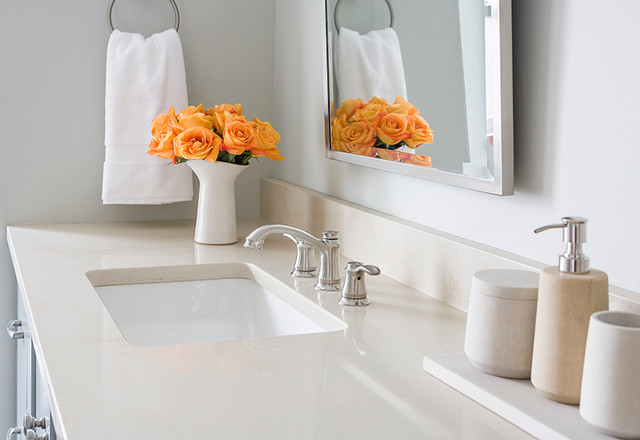What Are The Best Materials For Bathroom Vanity Countertops?
Understanding the Best Bathroom Vanity Countertop Materials
Are you thinking about remodelling your bathroom and looking for the perfect vanity countertop material? This choice plays a crucial role in both the room’s functionality and its appearance. This is because your vanity countertop has to withstand daily use, resist moisture and stains, and enhance your bathroom’s overall appeal.
But with so many options, it can be a challenge to determine the best material for your bathroom vanity countertop.
In this article, we explore your top choices, their features, and their pros & cons to help you make an informed decision.
Let's dive in!
Evaluating Countertop Materials for Your Bathroom Vanity
Your bathroom vanity’s countertop serves as a focal point and should be both functional and visually appealing. Selecting the right material is crucial, as is considering factors such as durability, maintenance, aesthetics, and cost. Let's explore some of the best materials available for bathroom vanity countertops.
Marble
Marble is a timeless and luxurious choice for bathroom vanity countertops. Its natural beauty, veining patterns, and various colour options make it highly desirable. However, marble is a porous material, making it susceptible to stains and etching from acidic substances. Regular sealing and proper maintenance are essential to preserving its elegance.
Please note that marble is an expensive material that requires professional installation. Ensure you have a big enough budget when looking for potential bathroom vanity countertop options.
Granite
Granite is a popular option due to its durability and unique natural patterns. It is heat-resistant, scratch-resistant, and available in various colours and finishes. Granite requires periodic sealing to maintain its resistance to stains and moisture. It is also an expensive material that requires professional installation.
Quartz
Quartz countertops are engineered using natural quartz combined with resins. The result is a durable, non-porous surface. It offers a wide range of colours and patterns, including designs that mimic the look of natural stone.
Quartz countertops are highly resistant to stains, scratches, and heat, making them an excellent choice for bathroom vanity countertops. It is one of the most cost-effective solutions for bathroom countertops as it significantly improves your home’s resale value.
4. Solid Surface
Solid surface countertops are made from a blend of acrylic or polyester resins with fillers. They offer seamless integration and a wide array of colour options. Solid surface countertops are non-porous, resistant to stains and moisture, and can be easily repaired if scratched or damaged.
On the downside, this material is soft and prone to scratches and dents. It is also not DIY friendly and requires professional installation. Even though it may not fetch any return on investment, it is a very budget-friendly option.
5. Laminate
Laminate provides an affordable and versatile option for bathroom vanity countertops. With advancements in design and manufacturing, it can replicate the look of natural stone or wood at a fraction of the cost of these materials.
However, laminate is not the best choice for vanity countertops as it is susceptible to moisture.
6. Concrete
Concrete countertops have gained popularity for their customizable designs and modern appeal. This is due to the fact that they can be cast in various shapes and sizes, allowing for personalized creations. Concrete countertops are durable and heat-resistant but require regular sealing to prevent staining. They also tend to be cold which can be an issue during the winter months if there is any air leakage to the outside.
7. Porcelain Tile
Tile countertops offer endless possibilities in terms of colours, patterns, and textures. They are highly customizable and provide a versatile surface for bathroom vanity countertops. However, the grout lines between the tiles require regular maintenance and can be prone to staining if not properly sealed.
This option requires professional installation, like most of these options. Make sure you understand the installation process of porcelain tiles before making your purchase.
8. Wood
Wood countertops bring warmth and natural beauty to bathroom spaces. They can create a rustic or contemporary look, depending on the type of wood you use. Wood countertops require periodic sealing to protect them from moisture and stains and aren’t the best choice of material as wood is susceptible to moisture damage.
Frequently Asked Questions (FAQs)
Q1. How do I maintain and clean marble bathroom countertops?
Clean them regularly with a pH-neutral cleaner and avoid using acidic substances. Use a soft cloth or sponge for cleaning and promptly wipe away any spills to prevent staining.
Q2. Can I place hot objects on quartz countertops?
Quartz countertops are heat-resistant but not heat-proof. While they can withstand moderate heat, it is advisable to use trivets or hot pads to protect the surface from excessive heat exposure.
Q3. Are laminate countertops durable enough for bathroom vanity?
They are but require care to avoid scratches and burns from hot objects. Using cutting boards and hot pads can help protect the surface.
Q4. Are wood countertops suitable for wet environments like bathrooms?
Wood countertops can be used in bathrooms but require regular sealing to protect them from moisture. It is essential to wipe away any spills promptly to prevent water damage.
Choosing the right material for your bathroom vanity countertop is a crucial decision. Consider factors such as durability, maintenance requirements, aesthetics, and budget when making your choice. There is a material that is sure to meet your needs and elevate the overall look of your bathroom. Get in touch with your best local home improvement store to get the right option for your bathroom.





Comments
Post a Comment